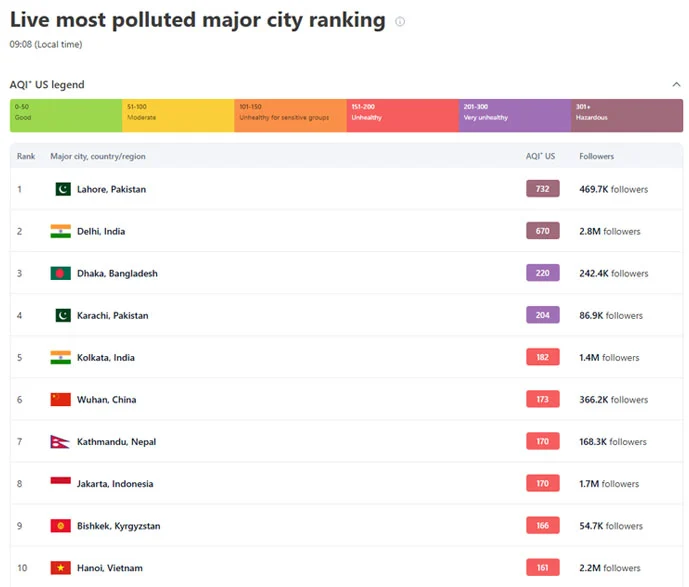### Punjab Declares Health Emergency as Smog Crisis Intensifies
The worsening smog situation in Punjab has prompted the provincial government to declare a health emergency in Lahore and Multan, the two cities most severely affected by the pollution. As authorities continue their efforts to combat air pollution, the air quality in these cities has reached alarming levels, posing a serious threat to public health.
Lahore has maintained its position as the world’s most polluted city in terms of air quality, while Multan has ranked as the most polluted city in Pakistan, according to data from Swiss air quality monitoring group, IQAir.
### School Closures Extended
On Friday, Senior Minister for Information and Environment Protection, Marriyum Aurangzeb, announced that the closure of schools in smog-affected areas of the province would be extended for another week due to hazardous air quality. The minister confirmed that colleges and universities would shift to online classes to ensure the safety of students during this critical period.
Lahore, a city of over 14 million people, is consistently ranked among the world’s most polluted urban areas, particularly during the winter months when smog worsens. This month, air quality levels in Lahore reached a record low, with the Air Quality Index (AQI) dropping as low as 732 before improving to 669 by the afternoon, as reported by IQAir.
### Strict Measures to Combat Smog
The provincial government has implemented several urgent measures to address the severe air pollution, including:
– **School Closures**: Schools will remain closed for an additional week, and online classes will be conducted for colleges and universities.
– **Outdoor Activity Ban**: Authorities have imposed a ban on most outdoor activities in eight districts severely affected by smog, which will last until November 17.
– **Early Restaurant Closures**: Restaurants, shops, and malls have been directed to close by 8 pm, with new operating hours for restaurants in Lahore and Multan limiting them to serve customers until 4 pm, offering only takeaway service thereafter.
– **Weekend Lockdown**: A full lockdown will be enforced in Lahore and Multan on Fridays, Saturdays, and Sundays to curb the pollution, with further decisions to be made based on data reviews by Wednesday.
– **Construction Ban**: The government has also imposed a ban on construction activities in both cities from Saturday until the following Sunday to reduce dust and air pollution.
### Lahore High Court Calls for Long-Term Smog Control Plan
Amid the crisis, the Lahore High Court (LHC) has emphasized the need for a comprehensive, long-term smog control policy. Justice Shahid Karim, who presided over a hearing on the issue, called for a strategy that spans at least 10 years. The court directed the Advocate General of Punjab, Khalid Ishaq, to discuss the proposed policy with Punjab Chief Minister Maryam Nawaz and urged the government to develop a detailed plan.
During the proceedings, the Advocate General reported that a budget had been allocated for introducing electric buses in the province, expected to begin operations by June next year. He also provided updates on efforts to manage floodwaters, conserve rainwater, and reduce ground temperatures through urban forestry. A progress report on the urban forestry project is expected by March.
The court recommended that the government study Beijing’s environmental model and apply its lessons to Punjab. Additionally, the court proposed banning the establishment of housing societies on agricultural land, planting more water-conserving trees, and requiring water treatment plants for homes on 10-marla plots.
The LHC has requested regular updates on the implementation of smog control measures and adjourned the hearing until next week.
### Health Crisis: Smog Affects Millions
The severe air pollution has already caused significant health problems for the residents of Punjab. The Punjab Health Department reported that over 1.9 million people sought medical treatment in October alone for smog-related illnesses, including respiratory issues, asthma, heart diseases, and strokes.
In Lahore, 119,533 asthma cases were diagnosed in October, while 13,773 heart disease cases and 5,184 stroke cases were recorded across Punjab. With the air quality still hazardous, health experts warn that the situation could lead to further health complications unless immediate measures are taken to improve air quality.
The health department has advised citizens to avoid unnecessary outdoor activities, keep windows and doors closed, and wear face masks to protect themselves from the toxic air.
### Cross-Border Pollution
Authorities in Punjab have attributed the current pollution crisis to a combination of local emissions and pollution from neighboring India, where northern regions are also grappling with hazardous air quality. The provincial government has stated that it will take up the matter of cross-border pollution with India through Pakistan’s foreign ministry.
As the winter season continues, the smog problem is expected to persist, affecting millions of people across the region. With air quality in Punjab at dangerously high levels, the government is under increasing pressure to implement both short-term and long-term measures to safeguard public health.



